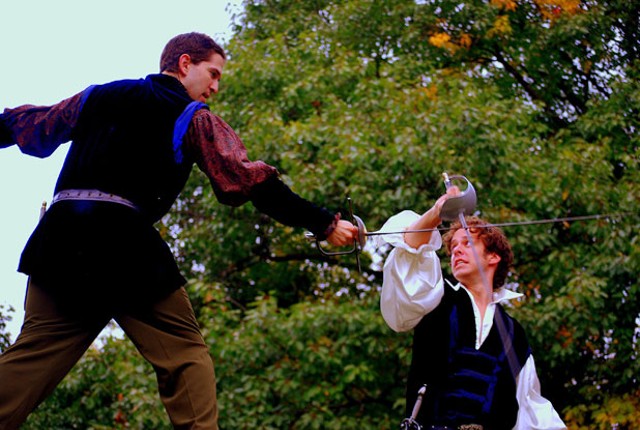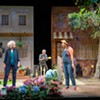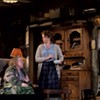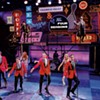Published October 17, 2012 at 8:03 a.m.
Every character, scene and line in Hamlet has been debated endlessly. In some ways the genius of the play is its protean quality — it will conform to any psychology, envelop any philosophy, reflect precisely what interests you most. In that sense, you owe it to yourself to see Hamlet whenever you can, for each staging brings something new to the surface.
In Lost Nation Theater’s current production, the emphasis is on the revenge plot, with Hamlet’s anger overshadowing his anguish. Vigorous pacing brings out the energy in Shakespeare’s text, while solid acting reveals the poetry of the language.
The play begins with the words, “Who’s there?” and from that tense query onward, the Danish court is embroiled in intrigue. Hamlet is still in mourning for his dead father, the king of Denmark, when his mother Gertrude swiftly remarries — to his uncle Claudius, no less. A ghost confirms Hamlet’s suspicions about his father’s untimely death at Claudius’ hand, and, with some reluctance, Hamlet accepts the duty of revenge. To observe Claudius and Gertrude closely, Hamlet feigns madness, and carries his act to the point of antagonizing his love interest, Ophelia. To test Claudius’ guilt, he engages a troupe of traveling actors to stage a play that reenacts the crime. All in all, Hamlet includes poisoning, stabbing, an offstage drowning, a skeleton unearthed and a climactic sword fight that spares almost no one.
Hamlet is a play about choices, but it doesn’t just pose dilemmas; it invites the audience to plunge into each character’s interior life and feel the pain of choosing. A director has choices, too: Should Hamlet embody the energy of revenge or the torpor of depression? How mad is he? Should the director steer us toward conclusions or let us reach our own interpretations?
At LNT, director Kim Bent forgoes the heavy hand. If he leans toward any pole, it’s that of emphasizing Hamlet over the supporting characters. This is an understandable bias, because whenever Hamlet isn’t talking, someone is talking about him.
Hamlet presents a remarkable combination of tense plot and intellectual exploration. The play gives each major character a moment of introspection, whether it’s about the compromise struck with a guilty conscience, the nature of loyalty or the balance between parental and erotic love. Shakespeare’s soliloquies are not just windows into Hamlet’s thoughts but glimpses into how the mind works.
Caleb Probst has the vocal and physical intensity for this role, and he convincingly conveys Hamlet’s ability to distance himself from others with sarcasm. He lets an angry undercurrent bubble up, then chases it with irony, revealing his character’s pained detachment from the world. Probst is at his best when a scene allows him to connect with a fellow actor, as in his cruel and crazed jilting of Ophelia (Kate Kenney). Kenney staggers in confusion, then collapses in misery; their interplay requires each to push the other more and more fiercely, until Ophelia is left wounded and hollow.
When Probst takes on other targets, the connection isn’t always there, making the results less compelling. Gertrude (Tracey Girdich) doesn’t earn Hamlet’s revulsion or contempt. Paul Molnar gives Claudius a cheerful, levelheaded quality — he seems to wonder if Hamlet is simply missing the point of court life.
Probst finds nuance in the soliloquies and appears to relish the great challenge of Hamlet’s inconstancy. The feigned madness never runs the risk of carrying him off; he always retains control, the better to showcase animosity over sorrow. Probst also seeks the romantic in the role, looking for the points where Hamlet can glow with the heat of his own pain.
Hamlet is too long a play to stage intact: The full play can run five hours. Besides making the cuts that polish the gem, Bent has pared the cast judiciously so that eight actors can play all the roles.
You won’t miss the lost courtiers heaved overboard, but you may have some trouble with a single pair of actors handling the roles of Laertes and Horatio, Rosencrantz and Guildenstern, two of the traveling players, and pretty much any other character requiring a youthful countenance. Christopher Scheer and Eric William Love gamely tackle them all, but for all their enthusiasm, we are too conscious of the quick-change stunt. Rosencrantz and Guildenstern are played for weak comedy; the play-within-a-play players vamp. But Love’s tender Horatio and Scheer’s strong Laertes do stand out as solid characters.
Mark Roberts takes on the roles of the Ghost and Polonius, as well as assorted military and regal figures. More than quick change is necessary to pull that off, as Polonius must appear in the same scene in which Hamlet sees the ghost. Bent has a high-tech solution that I won’t reveal here, but it lacked the magic to dazzle this reviewer’s eyes. Roberts gave the ghost a rather petty urgency for revenge, without the necessary overtone of menace that spurs the philosophical Hamlet to bloody action. As Polonius, however, Roberts nicely avoids overdoing the character’s windbag tendencies.
Robert Nuner ably handles seven roles, and is especially memorable as the Gravedigger.
Bent designed the simple in-the-round set, and Donna Stafford painted the beautiful faux-stone floor. It’s not especially Elsinore-ish — there’s no sense of a castle’s cold, dark corridors — but it’s highly adaptable, and you look forward to the climactic sword fight from the moment you take your seat.
When it comes, choreographed by Dan Renkin, the fighting does not disappoint. Renkin is good at building tension, and his repertoire of swordplay moves is impressive, including a few tussles with surprising outcomes. The swords blaze, but Renkin and Bent are always telling the story through the fighters, and Hamlet’s innocent pleasure in combat shifts to the dark realization that this battle has the highest stakes.
Nancy Smith’s costumes are fine, especially Hamlet’s richly textured combination of black velvet against black fabric.
Bent’s skillful use of space underscores his rhythmic sense for dramatic action, and Probst delivers a strong performance. Add this one to your collection of Hamlets.
"Hamlet," directed by Kim Bent, produced by Lost Nation Theater at Montpelier City Hall Auditorium. Thursdays through Sundays, October 18 through 28; Thursdays at 7 p.m.; Fridays and Saturdays at 8 p.m.; Sunday, October 21, at 7 p.m.; Sunday, October 28, at 2 p.m. $25-30. Info, 229-0492. lostnationtheater.org
More By This Author
Speaking of...
-

Executive Director Kurt Thoma Leaves Barre Opera House
Mar 5, 2024 -

Vermonter's Musical Bound for Broadway With Hillary Clinton as a Producer
Oct 25, 2023 -

Phantom Theater Finds New Winter Venue in Waitsfield
Oct 13, 2023 -

Double E 2023 Summer Concert Series Kicks Off With the Wailers
Mar 17, 2023 -

Off Center for the Dramatic Arts to Reopen in the New North End
Sep 23, 2022 - More »
Comments
Comments are closed.
From 2014-2020, Seven Days allowed readers to comment on all stories posted on our website. While we've appreciated the suggestions and insights, right now Seven Days is prioritizing our core mission — producing high-quality, responsible local journalism — over moderating online debates between readers.
To criticize, correct or praise our reporting, please send us a letter to the editor or send us a tip. We’ll check it out and report the results.
Online comments may return when we have better tech tools for managing them. Thanks for reading.










































